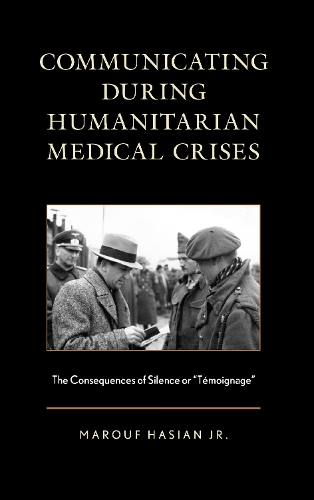
Communicating during Humanitarian Medical Crises: The Consequences of Silence or Tmoignage
(Hardback)
Publishing Details
Communicating during Humanitarian Medical Crises: The Consequences of Silence or Tmoignage
By (Author) Marouf Hasian
Bloomsbury Publishing PLC
Lexington Books
18th March 2019
United States
Classifications
Professional and Scholarly
Non Fiction
Communication studies
323.04
Physical Properties
Hardback
306
Width 159mm, Height 232mm, Spine 29mm
630g
Description
The Promise and Perils of " Silence" or " Temoignage" During Humanitarian Crises provides readers with a nuanced study of what happens when historical and 21st century medical humanitarian communities, armed with their idealistic rhetorics, choose whether to speak out or remain silent during various military or medical crises. The author uses a series of case studies from the late nineteenth century to the early twenty-first century to illustrate the politicized nature of these decisions. Unlike some that focus on the prescriptive need to follow certain universal medical humanitarian principles during crises, this book highlights the precarious nature of what some scholars call medical advocacy/witnessing or what the French call tmoignage. The author argues that regardless of whether we are talking about lack of action during colonial crises or the Holocaust, it is oftentimes the lack of political will that determines how like neutrality or impartiality are interpreted. The book also acquaints readers with some of the challenges that have been recently posed to the new humanitarian Doctors Without Borders personnel, who have witnessed the targeting of medical hospitals and clinics. What researchers call the weaponization of medical care affects many in need living in places like Afghanistan, Iraq, Yemen, or Syria. The author concludes the book by underscoring the point that it is the presence or absence of political will, and not the inherent epistemic value of medical humanitarian principles, that dictates when this advocacy succeeds or fails.
Reviews
Hasian's Communicating during Humanitarian Medical Crises is one of the - if not the - first project on tracking the way that medical humanitarianism functions as a rhetorical enterprise. Employing deft historical analyses of late 19th century to 21st century cases involving 'medical advocacy,' Hasian argues robustly that political will dictates the success of medical efforts, rather than simply humanitarian principles alone. Whether aid groups succeed in their aims depends largely on the presence or absence of their political will. In the process of his smart, original, and watershed examination of rhetorical text in ideological contexts, Hasian reminds us that medical humanitarian work is framed as politicized in and of itself. This is a must-read for those interested in medical humanities, health rhetoric, the rhetoric of science, and ideological discourses of humanitarianism, especially in medical advocacy milieus. -- Jason Black, University of North Carolina, Charlotte
Hasian presents an engrossing tour of the evolution of medical humanitarianism in the 20th and 21st centuries. The twists and turns of neglect, relief and weaponization are highlighted--illustrating the power of crisis to manifest multiple rhetorical formations for both the good and ill of those most vulnerable. -- Stephanie Houston Grey, Louisiana State University
Author Bio
Marouf Hasian, Jr. is professor of communication at the University of Utah.
